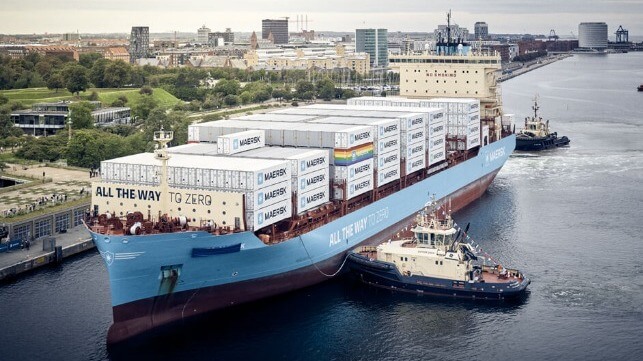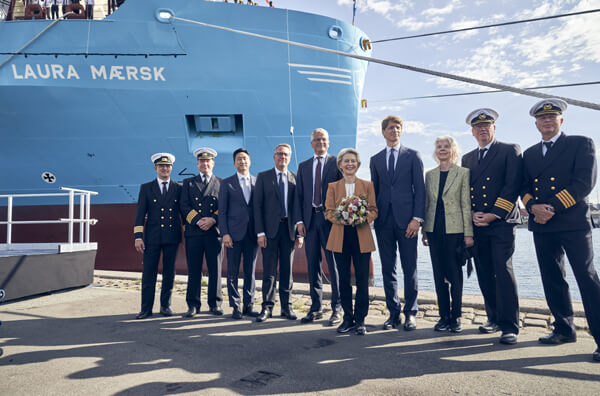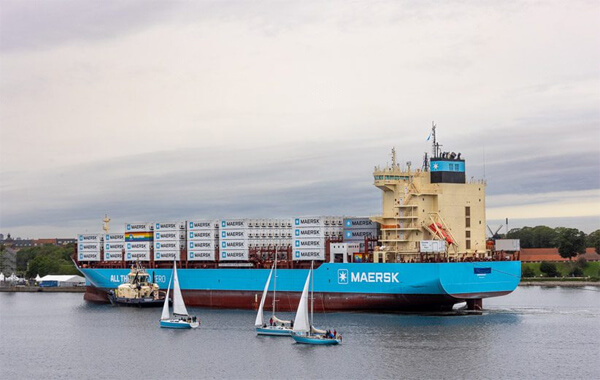Maersk Celebrates Naming of First Methanol-Fueled Containership

Maersk placed its first methanol-fueled container ship official into service with a naming ceremony in Copenhagen today of the Laura Maersk. While it is not the first methanol-fueled ship, it is the first for the container shipping industry and at the forefront of a new era that will see other majors including CMA CGM, COSCO, Evergreen, and OOCL introduce dual-fuel methanol containerships as well as feeder operations including X-Press Feeder.
The name of the ship was confirmed by Ursula von der Leyen, President of the EU Commission who said she was honored to usher in the era of green container shipping. Laura Maersk is a name with significance for the company as Captain Peter Maersk Moller named his first steamship in 1886 Laura. It was also the name of the first ship to wear the white seven-pointed star on a light blue background which has become the familiar livery of Maersk and its house flag. The name has been used repeatedly at historic moments over the life of the company.

EU Commission President von der Leyen at the naming ceremony (Maersk)
“This Laura represents an industry in revolution but of a green character,” said the company’s current chairman Robert Uggla, great-grandson of company founder and CEO of A.P. Moller Holding. He acknowledged the ship as small in size but important in the role it plays in the industry.
Built at Hyundai Mipo Dockyard in Ulsan, South Korea the ship was delivered in July 2023 just over two years after it was ordered. The main engine is a MAN B&W 6G50ME-C9.6-LGIM-HPSCR built by Hyundai that produces 10,320 kW along with HiMSEN auxiliary engines giving the ship a speed of 17.4 knots.
Maersk reports that the vessel has a methanol fuel capacity of 1,400 cbm split between two longitudinal tanks located forward of the engine room bulkhead. Due to the lower energy density of methanol, they expect fuel consumption to be approximately double that of traditional fuel. The vessel is designed for an operating range of 6,000 nautical miles on green methanol, but can also use traditional marine fuel. The vessel is expected to initially bunker once every five weeks with green methanol in Rotterdam.

The feeder ship will give the company critical experience with methanol operations (A.P. Møller Holding)
Laura Maersk is 32,614 dwt with a length of 564 feet and a 105-foot beam. It has a capacity for 2,136 TEU or 398 RFEU (Reefer forty-foot-equivalent). She officially enters service in October sailing on a Baltic route of Bremerhaven - Kiel Canal – Helsingborg – Halmstad – Fredericia – Kalundborg - Kiel Canal – Bremerhaven. To maintain this route, she was designed to sail in sea ice of up to 1 meter thickness.

that matters most
Get the latest maritime news delivered to your inbox daily.
The ship will provide Maersk with critical in-service information enhancing its understanding of operating on methanol and it will provide experience for crews in handling the alternative fuel. Starting in 2024, Maersk will begin the introduction of 24 ocean going containerships due for delivery by 2027 all employing dual-fuel methanol propulsion. The carrier is also undertaking a pilot project with MAN to convert existing engines to be able to operate on methanol. Maersk has declared a policy to only order new, owned vessels that come with a green fuel option.
Maersk has set a goal to transport a minimum of 25 percent of its ocean cargo using green fuels by 2030. Its target is for net zero greenhouse gas emissions by 2040.
